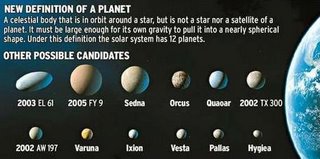
It's been a busy week for me, as one thing after another crowded writing out of my schedule. I thought I'd take a moment to reveal that I am, in fact, very much alive and still able to type. For those of you that wondered where I disappeared to for a week, this is the post for you.
Last week involved two orchestra rehearsals, my anniversary (two years), dinner several nights with various friends, teaching a sax lesson, writing a paper (handed in today), and counseling young Zach in the ways of Adobe Premiere. The kid is hooked. Fantastic.
Sunday was my first orchestra concert here. I cannot tell you how disorienting it is to get to a concert and find out that it's something other than you expected. First off, new chairs, which weren't really new, but rather old, and not at all what we'd rehearsed in. Which is just as well, but it still threw me off a little (positioning one's self to play horn on a chair is very much an art form, and I don't care what the trombone players tell you about it - they're wrong).
The concert was, I thought, the final presentation of six students who had won a concerto competition, held annually. I thought that they had already won, and that the chance to play with an orchestra was just a reward for winning. Turns out I was quite wrong: the concert WAS the competition. Some committee had weeded out these six kids, all under the age of 18, from hundreds of applicants, to play their solos with an orchestra in front of an audience and a judge. The judge would then rank them and one would win, what, I do not know.
All this to say that I wish I'd found this out after the concert. I'm usually ok under pressure, but when I found out that one kid or another was going to be winning or losing based on the judge's impression of their performance with the orchestra, I nearly keeled over. I used to be a much better player, but I suppose times change, and so does my playing. Things I nailed easily in rehearsal, I now screwed up. It was a sad moment for me. I'm sure it really wasn't that bad, but doing things like starting a phrase on the wrong note after I've had 40 measures to stare at it is just pathetic. But I guess I'll just have to put it behind me.
The highlight of the concert was the 12-year-old violinist from Queensland. This kid played like a pro, and is half my age. Neither of my favorite soloists (the sax player or the first cellist) won. In fact, they were the lowest two scores. Apparently, the sax player should've memorized his music, and the cellist should've ... done something else. I have no idea what the judge's problem was, but I thought he was a bit insulting towards the pianist and the sax player, neither of whom memorized their music. I think they did great, although I'll admit the piano concerto was a tad boring.
Last week involved two orchestra rehearsals, my anniversary (two years), dinner several nights with various friends, teaching a sax lesson, writing a paper (handed in today), and counseling young Zach in the ways of Adobe Premiere. The kid is hooked. Fantastic.
Sunday was my first orchestra concert here. I cannot tell you how disorienting it is to get to a concert and find out that it's something other than you expected. First off, new chairs, which weren't really new, but rather old, and not at all what we'd rehearsed in. Which is just as well, but it still threw me off a little (positioning one's self to play horn on a chair is very much an art form, and I don't care what the trombone players tell you about it - they're wrong).
The concert was, I thought, the final presentation of six students who had won a concerto competition, held annually. I thought that they had already won, and that the chance to play with an orchestra was just a reward for winning. Turns out I was quite wrong: the concert WAS the competition. Some committee had weeded out these six kids, all under the age of 18, from hundreds of applicants, to play their solos with an orchestra in front of an audience and a judge. The judge would then rank them and one would win, what, I do not know.
All this to say that I wish I'd found this out after the concert. I'm usually ok under pressure, but when I found out that one kid or another was going to be winning or losing based on the judge's impression of their performance with the orchestra, I nearly keeled over. I used to be a much better player, but I suppose times change, and so does my playing. Things I nailed easily in rehearsal, I now screwed up. It was a sad moment for me. I'm sure it really wasn't that bad, but doing things like starting a phrase on the wrong note after I've had 40 measures to stare at it is just pathetic. But I guess I'll just have to put it behind me.
The highlight of the concert was the 12-year-old violinist from Queensland. This kid played like a pro, and is half my age. Neither of my favorite soloists (the sax player or the first cellist) won. In fact, they were the lowest two scores. Apparently, the sax player should've memorized his music, and the cellist should've ... done something else. I have no idea what the judge's problem was, but I thought he was a bit insulting towards the pianist and the sax player, neither of whom memorized their music. I think they did great, although I'll admit the piano concerto was a tad boring.











